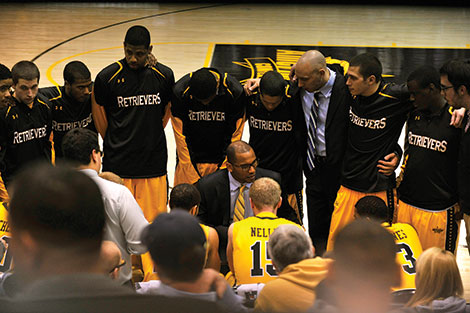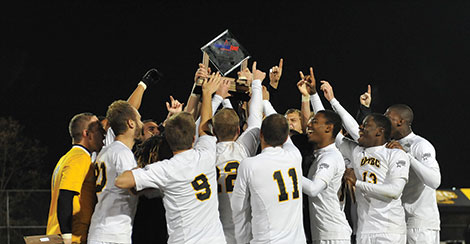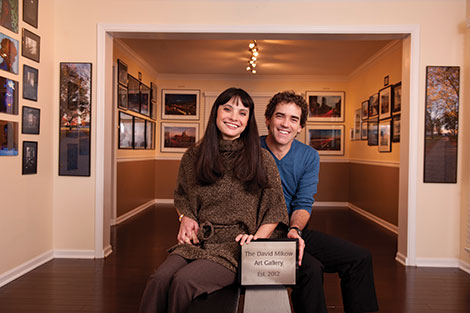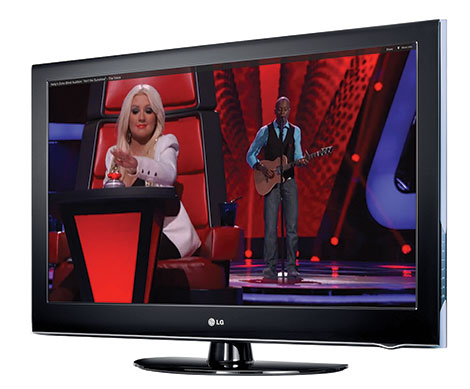SMART WINS
Aki Thomas, acting head coach of UMBC men’s basketball team, is a cool customer at courtside. He exudes calming reassurance in team huddles, and he’s more likely to remove his glasses and stare than bark at a referee after a bad call.
Thomas became head coach in October – less than a month before the season opener – after the resignation of Randy Monroe. He has been coaching and recruiting at UMBC since 2007, after a playing career that included time at the University of Colorado and Howard University, as well as a stint playing professional basketball in Venezuela.
“I’ve been developing my own coaching philosophy for almost nine years,” Thomas says. Stylistically, he favors an up-tempo game. “I like to try to speed things up on the defensive end,” he says. “Look for opportunities in transition.”
Thomas’ approach to recruiting also fits in well with UMBC’s reputation as a school where student-athletes play hard and study hard. “The number one thing I look for in a player is intelligence,” he says. “Book smarts and what we call basketball IQ. I want them at a very high intelligence level. Because I think smart wins.”
Beneath the cool exterior, however, Thomas possesses a fierce desire to win. At a key moment in a home game against New Hampshire, the head coach reminded his players that “nobody’s hungrier than we are right now.”
The hungry Retrievers responded by seizing control of the game and cruising to a 68-57 victory.
— Richard Byrne ’86
TOURNEY TESTED
After an extraordinary run of games at the end of the season, the 2012 UMBC men’s soccer team emerged not only with an America East championship, but also a first-round victory on penalty kicks in the NCAA men’s soccer tournament against Old Dominion University.
The team’s exit from the tourney was also extraordinary: a loss on penalty kicks against the nation’s fifth-ranked team and defending NCAA men’s soccer champions, the University of North Carolina (UNC), on the Tarheels’ home field.
It was the team’s second appearance in the NCAA Men’s Soccer College Cup in the last three years.
“We’re so proud of the achievements of men’s soccer team and coach Pete Caringi,” said UMBC President Freeman A. Hrabowski, III, who observed that academic achievements have also been a hallmark of the university’s men’s soccer program.
Indeed, the day after their first round NCAA victory over Old Dominion, the men’s soccer team was also recognized with a 2011-2012 College Team Academic Award from the National Soccer Coaches Association of America (NSCAA), given to 221 men’s programs in America with a cumulative grade point average of 3.0 or higher. (The university’s women’s soccer team also was recognized with the same award, and UMBC was one of 150 programs in which both its men’s and women’s programs received the NSCAA award.)
The 2012 Retrievers sealed an automatic bid to the NCAA tournament with a victory over the University of New Hampshire in the America East championship game, held on November 10 at Retriever Soccer Park.
THE GALLERY NEXT DOOR
Each night when professor of political science Carolyn Forestiere returns to her Catonsville home, she finds a little bit of UMBC waiting on the walls – and often some fellow art lovers, too.
Opening an art gallery in one’s living room isn’t for everybody. But for Forestiere and her husband, Asher, throwing open their doors a few nights a week as the David Mikow Art Gallery (named after Asher’s father) made perfect sense.
“We thought: What’s the purpose of filling a house with art and not sharing it?” she says above the hubbub of a December opening reception for “Images in Print” – a selection of colorful monoprints and lithographs by university alumni and students, curated by visual art professors Irene Chan and Calvin Custen.
At one end of the room, Heather Brown ’13 explains how she created “Isadora II,” a lively monoprint inspired by Italo Calvino’s Invisible Cities. She rolled the paint, dashed it with solvents and the tips of various tools, she explains, “and then prayed it would turn out.”
At the other end of the room, Elizabeth Guidara ’11, political science, tells passersby about a series of prints featuring world dictators and their supposed lovers. Carving multiple layers of linoleum so they line up to allow for vibrant four-color printing is “a mix of science and luck,” she says.
As the evening rushes on, the guest book fills with names from UMBC, the neighborhood and beyond.
“When we moved to Catonsville, we wanted to make this our community,” says Forestiere. “And we have. This is something we’ve done together.”
Learn more about upcoming shows at The David Mikow Art Gallery here…
— Jenny O’Grady
SINGING SOFTLY
Nelson Emokpae ’03, psychology (a.k.a. Nelly’s Echo), has toured hundreds of colleges and universities over the past two years, but he has not yet performed at his alma mater.
Along with releasing his third record, Emokpae says that a concert at UMBC is on his “to do” list for 2013. But 2012 held its own magic for the alumnus when he was featured on NBC’s hit musical performance show The Voice.
Emokpae made waves nationally when Christina Aguilera selected him to be on her team mere seconds into his rendition of Bill Withers’ 1971 hit “Ain’t No Sunshine,” and he says that the coaching sessions he received from Aguilera during his run on the show were one of the highlights of the experience. Emokpae observes that Aguilera is “a normal person with the same fears and insecurities everyone has,” and her guidance “lent me a hand to help me with my journey.”
Despite his elimination on a subsequent episode after a one-on-one showdown with fellow contestant De’Borah, Emokpae feels immense gratitude for his national TV experience. The Voice, he enthuses, was “an episode in my life movie.”
Emokpae’s life movie has been anything but uneventful – even before The Voice. He fled his native Nigeria with most of his immediate family because of political unrest when he was only fifteen. They settled in Baltimore where they were eventually reunited with his father, Roland, who had been wrongfully imprisoned in Nigeria.
Although music had always been an integral part of his life (one favorite childhood pastime was setting his poetry to music), Emokpae majored in psychology at UMBC. Yet he also observes “your path picks you,” and his constant presence in the university’s music department – strumming his guitar and jamming with friends – exposed him to the music of the Maryland Camarata, led at that time by Aya Ueda.
Emokpae introduced himself and asked for an audition, and despite not having any previous formal vocal training, his natural ability secured him a spot with the group for the rest of his time at UMBC – an experience that offered him the chance to learn to sight-read music and sing lead in an ensemble. The latter experience in particular, says Emokpae, “really makes you grow up as a vocalist.”
After obtaining a doctorate in physical therapy, Emokpae kept making music as he also made a living as a physical therapist. But at the age of 30, he was persuaded to quit his day job and devote himself fully to his music career.
“I decided I didn’t want to be that old man on his front porch wondering ‘What if?’” explains Emokpae.
The national exposure that The Voice gave Nelly’s Echo means that Emokpae’s life movie promises to be even more interesting in years to come. Among his ambitions include winning a Grammy (“Not for the sake of validation,” he says, “but for affirmation that the voice for the soft-spoken can be heard in this sometimes very noisy world.”) and using any success to build infrastructure in the two areas in which he has worked: health care and music.
“I’d like to build hospitals and music venues in impoverished cities around the world, starting with Africa,” Emokpae says. He also believes that music venues are equally important: “These can be places in communities where young people can find hope.”
Watch Nelson Emokpae ’03, psychology, on an episode of The Voice…
– Sara Barker
Tags: Winter 2013




